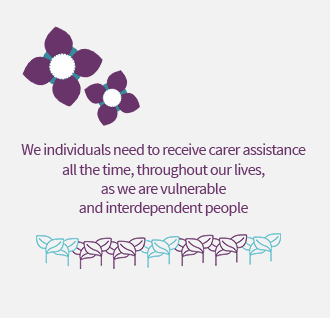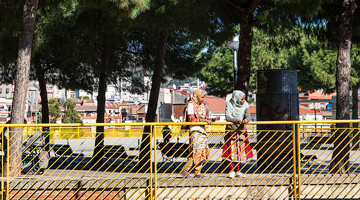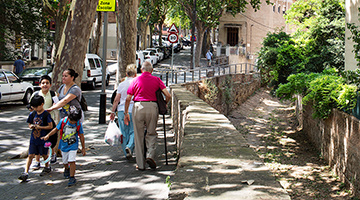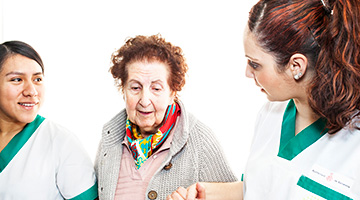

We are vulnerable and interdependent beings. As individuals, we are born extremely frail. We take a year to stand up, two to communicate through language and four to be able to dress ourselves on our own to protect ourselves from the cold. Our vulnerability and dependence explain why we live in a community. We depend on time, work and the affection we receive from others to survices.
When we talk about ‘care’ we are referring to a whole range of tasks that produce goods and services which serve to regenerate people’s daily and inter-generational physical and emotional well-being, and which normally arise in intimate circles and within the framework of households.
We all need to receive ongoing care of different types and in varying intensities throughout our lives, depending on the life stage we find ourselves in, and on our capacity for self-care and for caring for others at each moment of our lives While childhood, old-age and times of sickness require specific, more intensive types of physical care, as people we need affection and emotional care all through our lives, even when we are healthy, independent adults. We need to think about the need for care not as an exceptional situation but rather as a feature inherent to our human condition, where we all have a right, but also the duty, to receive and provide care.
Bibliography:
Yayo Herrero, Marta Pascual and María González Reyes (2018). La vida en el centro: voces y relatos ecofeministas. Libros en Acción - Ecologistas en Acción.
Cristina Carrasco (ed.) (2014). Con voz propia: la economía feminista como apuesta teórica y política. La Oveja Roja.
Various authors (2017). Rebeldías en común: sobre comunales, nuevos comunes y economías cooperativas. Libros en Acción - Ecologistas en Acción.
Amaia Pérez Orozco (2014). Subversión feminista de la economía. Aportes para un debate sobre el conflicto capital-vida. Traficantes de Sueños.
What care do we have?
What care do we have?
In the current social and economic organisational model, care work is characterised as:

Being invisible
Being invisible
Care work is invisible, despite being crucial for keeping ourselves alive. Invisibility is a factor that contributes to its lack of social recognition and it is used to obscure the conditions of no social and financial rights under which care work is being carried out

Being free and precarious
Being free and precarious
Care-related work both inside and outside the home is mainly carried out by women and typified by unregulated labour relations and precarious wage and contractual conditions

Being shaped by sex, origin and social class
Being shaped by sex, origin and social class
Care work continues to be carried out from inside families and with private resources. Grandmothers, migrant workers, working-class women and women with a low educational level are the invisible protagonists

